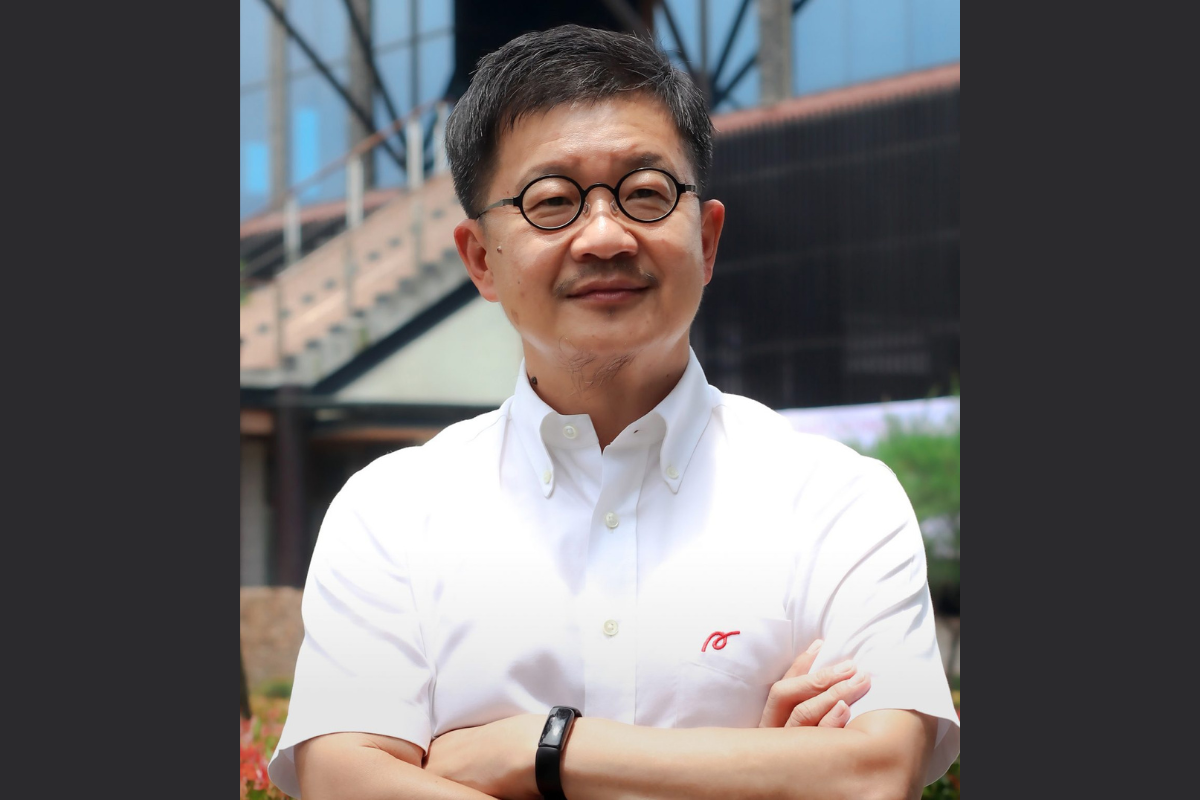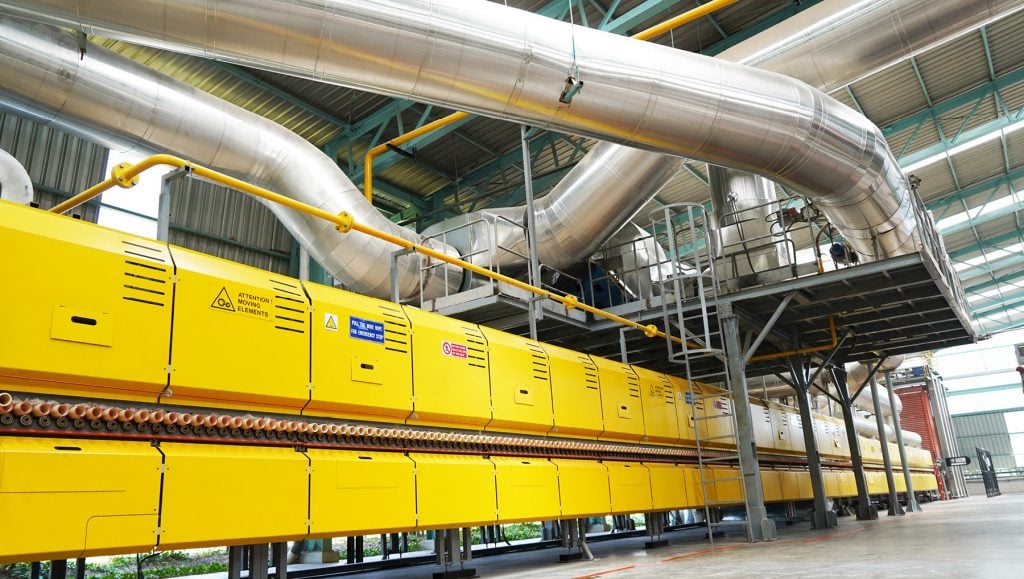The Human Touch: Tandean Rustandy
For Tandean Rustandy, building one of Indonesia’s top ceramics companies Arwana Citramulia wasn’t enough. The CEO says his company had a duty to enrich society at the same time as succeeding in the marketplace – a mission he’s tackled with a strong team at his side.
Throughout Tandean Rustandy’s life, a certain fragility has existed. Born to a humble family, things weren’t always easy. Money was scarce, and when Tandean left to further his education overseas, he did it on his own. "I had to support myself, my parents weren’t able to do it," he says. "So when I started Arwana, I did it with the same mindset."

Today, the fragility is on the shelves of the company Tandean created. Arwana Citramulia (Arwana) is a market leader for ceramic tiles in Indonesia. The Arwana brand name represents quality, affordability and a firm network of partners, suppliers and distributors throughout the archipelago.
This is the strong institution upon which Tandean built his – and Arwana’s – fortunes, all the while with his early experiences in mind. "The value of the company couldn’t rely on myself alone," the CEO says. "I had a vision for this company: that we had to be the best in our field, and we had to make a real contribution to society in return."
Of all the elements of the planning stage, Tandean says, it is vision that persists. "Most companies want to be the best, of course, but it’s how you get there that matters," he says. "For us, it had to be through innovation and creativity."
Armed with little else, in 1993 Tandean set out to create what has become a major player in Indonesia’s construction industry. "We started with three million square metres of ceramic tiles a year," he says. "Today, right now, we’re at 67 million."

Manufacturing is done at Arwana’s factories, strategically located around Indonesia and each designed specifically to serve its region. "We have five plants, and we’re still growing," Tandean says.
Tandean expects to add a further 20 million square metres to Arwana’s output over the next five years. "Our market is not a problem at all," he says. "Our growth has been very consistent because we’re based in a developing country. Many manufacturers in developing countries don’t produce their own brands. We do, and that’s why we’re the single largest brand in Indonesia."
The Arwana brand is the mainstay, but in 2011 Tandean introduced UNO, a premium range that targets the upper-middle market. "Many of our competitors don’t build their own brands, they’re OEMs. I’ve been asked many times why I don’t become OEM, and the answer is that I’ve built my own brand and I rely on myself."
The push to build the brand has at times been an uphill struggle. Tandean says it was important to ignore naysayers. "When you’re building something from scratch, who’ll trust you? There were so many big manufacturers competing against us, and retailers didn’t believe we could do it. But I didn’t listen to them."
Instead, he says, he built the system. "If you visit a McDonald’s anywhere in the US, the prices are the same. From New York to Montana. So I built that system into Arwana’s model: the selling price is the same everywhere."
With a model in place, Tandean had to assemble the right team to support it. "It’s not easy to get people to work in manufacturing," he says. "You really have to build something that people are attracted to, that they want to work for."
It’s not easy to get people to work in manufacturing. You really have to build something that people are attracted to, that they want to work for.
That he was not only able to recruit a strong group of people but retain them long-term speaks to the quality of Arwana. Rather than headhunting others within the industry, Tandean says Arwana prefers to upskill and invest in its people. "We build up our human resources from nothing," he says. "For example, our COO started as a management trainee, as did all my vice presidents and plant managers."
The secret, says Tandean, is recruiting people from small towns and smaller universities. "Our recruits don’t come from big cities or top universities, and that’s in keeping with our vision to give back to the community and create a real contribution to the country," he says.
"You have to look beyond the obvious places, and in human resources our approach is proven. People who started working for me in 1993 are still with me today," he says. "Their children are now almost 27 or 28 years old. And in fact, it’s that next generation we recruit now."
And that’s because the next generation has a completely different mindset than the people who were there at the start of Arwana’s journey. Tandean says the early 90s was a much more conservative time, but now there’s much more room for discourse on topics like the environment.
"We are a green industry," he says. "But when I say Arwana is an environmentally friendly company, I don’t believe anyone in South-East Asia runs a factory like we do. We may be a local, publicly listed company, but we meet the very high environmental standards Indonesia demands."
Arwana’s status as a publicly listed company also gives it transparency and strong corporate governance, Tandean adds. "Fund managers trust Arwana for that reason," he says. "We are well known in terms of our governance, and it’s part of why we’re the most profitable company in the ceramic field in the Asia–Pacific region."
That’s saying something given Arwana’s home country. Being an archipelago means that distribution costs around Indonesia are higher than they would be in a geographically unified nation. "It’s more than 20 per cent," Tandean says. "Our logistics are very expensive and it all adds up, yet we are still in high double-digit profits."
It’s also an issue when it comes to suppliers, which is why Tandean has gone to great lengths to ensure Arwana’s network of partners and suppliers are best in class. "We rely on them," he says. "And what you can’t do, as a buyer, is treat the supplier poorly. You have the power to buy, so you can’t just betray your suppliers by jumping to someone cheaper at a moment’s notice."
If you’re going to go to the effort and expense of getting supplies shipped around Indonesia, it may as well be the best, Tandean says. "All the machines I buy are always the best of the best. When you’re a manufacturer, there’s always a temptation to go with cheaper machines, but I’m always thinking about stability," he says.
"You’re building a factory. The dollars you save buying cheaply at the outset is money you’ll spend repairing or upgrading later."
We’re a very grounded company because we are hands-on. When we find the right distributor, we stick with them. When we find the best supplier, we don’t change them. When we have a problem, we discuss.
Clay is the building block of Arwana’s bread and butter, so when it came time to find a supplier, Tandean put this philosophy into practice. "My clay supplier is the largest in the world," he says. "We’re extremely close. In fact, most of my suppliers have been working with me since day one. You can’t just change suppliers like you’re buying a car. I don’t. I rely on them."
Arwana’s own subsidiary, Primagraha Keramindo (PGK), is the sole distributor of Arwana and UNO products. PGK works with a powerful network of 46 sub-distributors scattered across Indonesia – more than 25,000 retail outlets in total. "I built up that network," Tandean says. "I started with a couple, and now it’s huge. Many of them started without any capital, and right now they’re among the largest in their regions."
Even during the uncertainty of the COVID-19 pandemic, those relationships endured, and Tandean says it was a matter of trust. "When you build your relationship on trust, there’s nothing you can’t do together," he says. "If we need a supplier’s research in order to develop a new product, and if that trust is there, they can feel comfortable sharing that with us without feeling we’ll be taking advantage."
This network of relationships afforded Arwana the unique opportunity of running at full capacity throughout the pandemic. "We rely on very trustworthy suppliers, and they need to run their factories at full capacity in order to supply to us. They needed the assurance that we wouldn’t budge during COVID-19, and we could give that."
At the heart of any trust issue is humanity, and Tandean believes the human element is the unsung hero of Arwana’s success. "I think human relations are the most important part of the business. You don’t build a company and run it just to make money. Then you’re just an animal or a machine."
This is why, he says, Arwana puts so much emphasis on hiring local and focusing on developing medium-size businesses; it’s all a part of his vision to give back to the society that has helped him achieve the success he has. Along the way, Arwana has been able to build a team with real-life experience and skills gained in the field.
"We’re a very grounded company because we are hands-on. When we find the right distributor, we stick with them. When we find the best supplier, we don’t change them. When we have a problem, we discuss. If anything ever happens, we’re able to discuss because that’s how human relations work."
In a market as niche as ceramic tiles, it’s essential to rely on not only the people around you, but also yourself, Tandean believes. "If you look at the industry in Indonesia, you’d think anyone could make a better profit than us," he admits. "We’ve got the same suppliers, resources and raw materials, and everything costs the same. But what sets us apart are the people, the human element. I’m surrounded by fantastic people and each plays a crucial part in what we do."
He likens himself to a conductor to the orchestra that is Arwana. "When the conductor guides the action and then we build up, we become a very beautiful sound."